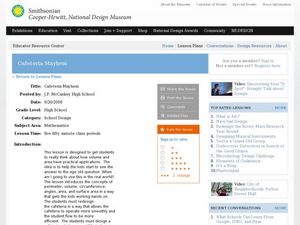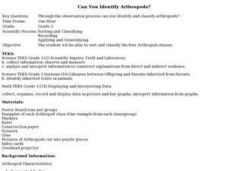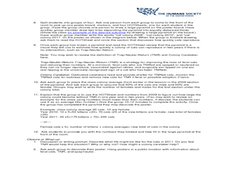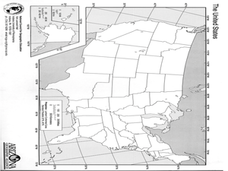Curated OER
Leap Into Exponential Functions
Studens identify the properties of exponents. In this algebra lesson, students grapha nd solve equaitons of exponential functions. They add, subtract, multiply and divide using exponents.
Curated OER
Leap Into Exponential Functions
Students use properties of exponents to solve equations. In this algebra lesson, students add, subtract, multiply and divide exponential functions. They graph and differentiate between exponential growth and decay.
Curated OER
Math Investigations Facilitation Plan
For this math lesson plan, students choose a topic involving math that interests them to investigate or research. Students make a plan detailing how they will investigate their topic; such as, keeping track of plant heights over time,...
Curated OER
Magnifiers
Students describe how several different objects magnify a provided sentence and decide if they are good magnifiers or not. They then write a sentence describing two properties an object must have in order to be a good magnifier.
Curated OER
Cafeteria Mayhem
Young scholars design a cafeteria floor plan. In this area and perimeter instructional activity, groups create an efficient lunchroom layout on poster board by using geometric shapes and formulas as the basis for their designs. In the...
Curated OER
Balloon Rocket
Learners observe a balloon rocket and how it relates to Newton's Third Law of Motion. In this balloon rocket lesson plan, students make a balloon rocket out of balloons, clothespins, straw, fishing line, and duct tape.
Curated OER
Parachutes: What Affects a Parachute
Students create a simple paper parachute. In this parachute design instructional activity, students examine the effects of the wind and make napkin parachutes.
Curated OER
Cooking a Few of my Favorite Things
Second graders publish a class cookbook of their own recipes. They explore the nutritional value of foods, calculate the measurements, and prepare a healthy recipe for the class.
Curated OER
Animal Homes
Students explore how an animal's relationship to its habitat affect the animal's survival. They discuss animal habitats and the animal's relationship to that habitat through the food chain, life cycle, community, and balance of nature....
Curated OER
Designing Samples/Simple Random Samples
High schoolers explore the concept of sampling techniques. In this sampling techniques lesson, students identify possible sources of bias in situations such as phone polls, supermarket surveys, and drawing names from a phone book. High...
Curated OER
Patriots of the Revolution
Fifth graders identify causes and effects of historical events in the American Revolution. They evaluate critical issues and events that led to the American Revolution. Analyze the views and lives of people of the Revolutionary Period.
Curated OER
Can You Identify Arthropods?
Third graders sort and classify the four Arthropod classes. They are given puzzle pieces of one Arthropod example. Each group is to put their puzzle together, glue it on a piece of construction paper and label the ir puzzle.
Curated OER
Understanding Cloud Formation
Students view a demonstration that simulates cloud formation. They read a poem about clouds, participate in a class demonstration using warm water and ice and write a paragraph summarizing their observations.
Curated OER
Kites: Patang - The Indian Fighter Kite
Students investigate the history of fighter kites and build their own. In this aeronautics lesson, students discover how other countries utilize fighter kites and where they originated. Students create their own fighter kites in class...
Curated OER
The Tale of the Feral - Care and Multiplication of Feral Cats
Students differentiate between a feral cat and a domesticated cat. In this cat lesson plan, students use the scientific method, calculate averages, solve story problems, and learn how a caretaker can help a feral colony live safely.
Curated OER
Building a Scale Model
Third graders create a model of the solar system. In this solar system instructional activity, 3rd graders create a scale model of the solar system. Working in pairs students solve mathematical problems to correctly measure the distance...
Curated OER
Make Your Own "Weather" Map
Students develop and apply a variety of strategies to solve problems, with an emphasis on multi-step and non-routine problems. They acquire confidence in using mathematics meaningfully.
Curated OER
A Fortnight of Furlongs
Young scholars perform a webquest to research information about the horse industry. They look at economic and the cultural impact of the industry on Central Kentucky and then create a group presentation that addresses all essential...
Curated OER
Volcano Research
Student demonstrates the ability to select and evaluate media. They access and organize information about volcanoes. Each student locates on a map a currently erupting volcano.
Curated OER
The Middle Ages: A Time of Conflict and Change
Students become familiar with the concepts of conflict and change and the relationship between them. They then analyze medieval social groupings to understand relationships among people and people groups.
Curated OER
The Giver: A Research Unit
Eighth graders complete a reading of Lois Lowry's, The Giver, and determine a social problem the effects the "utopian society." They research information about the social problem using a number Internet, print, and media resources. They...
Curated OER
Public Policy Changes Using Technology
Young scholars discuss the problem of wrestling on the playground that has resulted in injuries to classmates. They research the problem using print and Internet resources. They listen to a presentation by the high school wrestling...
Curated OER
Packing Materials
Students observe the effects of water on four different packing materials to determine which ones are more soluble. They then decide which material would be a good packing material to use for the environment and which may be a bad...
Curated OER
Route 66 And Population Patterns
Learners investigate the geography located along Route 66. They research how the population patterns change in certain areas along the highway. Students use the information in order to form hypotheses about how and why the population...

























